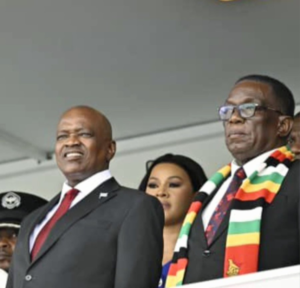GOLD RESERVE ALLEGATIONS DEBUNKED: FORMER RBZ GOVERNOR CLARIFIES MISCONCEPTIONS

Former Reserve Bank of Zimbabwe (RBZ) governor Gideon Gono has come forward to address claims by Zanu PF spokesperson Chris Mutsvangwa regarding the alleged theft of the country’s gold reserves. Mutsvangwa’s assertions that the reserves were sold to Saudi Arabia without receiving payment have sparked significant controversy. Gono insists these allegations are baseless and constitute a severe misrepresentation of the facts.
In a detailed public statement, Gono clarified that the transaction in question was not a theft but a strategic financial maneuver conducted in 2006, involving a US$150 million jewelry deal with a Saudi company. This deal was part of a broader strategy to secure a substantial line of credit amounting to US$600 million from a South African bank. This financial injection was crucial for Zimbabwe, allowing the importation of essential goods like electricity, fertilizer, and fuel amid stringent Western economic sanctions imposed in 2002.
Gono emphasized that the situation during his tenure was dire, with the RBZ running on empty when he took over in December 2003. The sanctions had severely hampered the government’s ability to operate effectively, and creative financial solutions were necessary to navigate these challenges.
He also pointed out that Mutsvangwa, who was the Zimbabwean Ambassador to China at the time, was misinformed about the details of the deal. According to Gono, Mutsvangwa’s absence from the country during the transaction period contributed to his current misunderstanding of the events.
Furthermore, Gono criticized the wasteful use of public funds spent on investigations spurred by such unfounded allegations. The Zimbabwe Anti-Corruption Commission (ZACC) conducted a thorough investigation into the deal, interviewing both Gono and his successor, John Mangudya, and concluded that there was no wrongdoing.
The former governor expressed concern over the potential damage such false claims could cause to individuals’ reputations, describing the accusations as character assassination. He reiterated that no gold reserves were lost during his tenure and that all transactions were above board, audited annually by reputable international firms like Deloitte & Touche and KPMG.
Gono’s statement also served as a call to respect the integrity of former governors and the challenges they faced. He highlighted the need for accuracy and truth in public discourse, particularly concerning historical financial transactions that have been publicly scrutinized and audited.
He proposed that if misunderstandings persist, a Commission of Inquiry should be established under the Commission of Inquiry Act to investigate these allegations transparently and comprehensively. This measure would help clarify the facts for the public and preserve the integrity of Zimbabwe’s financial institutions.
Gono concluded his statement by reflecting on his tenure as RBZ governor during a tumultuous period for Zimbabwe. He outlined the structured nature of the Saudi gold deal, which was intended to bolster the nation’s economy by leveraging its gold reserves for much-needed foreign currency. Despite the challenges, the arrangements were structured to ensure a net positive impact on the economy without any loss of gold reserves.
His closing remarks celebrated the efforts of the current government and the progress made since his tenure, urging the nation to focus on unity and constructive development rather than divisive rhetoric.
As Zimbabwe celebrates its 44th year of independence, Gono’s emphatic clarification serves as a reminder of the complexities of managing a nation’s economy under sanctions and the importance of safeguarding the reputations of those who have served.



